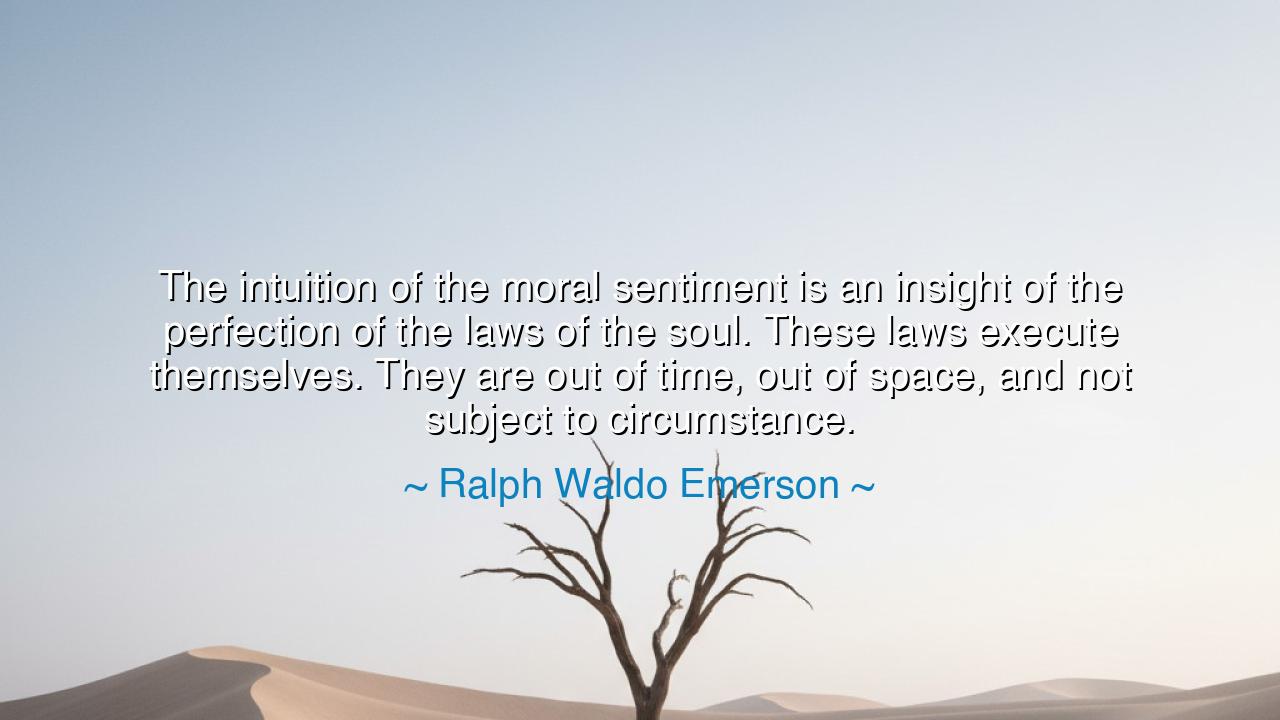
The intuition of the moral sentiment is an insight of the
The intuition of the moral sentiment is an insight of the perfection of the laws of the soul. These laws execute themselves. They are out of time, out of space, and not subject to circumstance.






Hear now the words of the sage Ralph Waldo Emerson, who declared: “The intuition of the moral sentiment is an insight of the perfection of the laws of the soul. These laws execute themselves. They are out of time, out of space, and not subject to circumstance.” This is no light phrase, but a thunderous hymn to the eternal order within man. Emerson, prophet of self-reliance and herald of transcendence, here proclaims that within each human being is a compass more ancient than kings, more enduring than empires, more radiant than the stars: the laws of the soul.
What are these laws? They are not written in books, nor carved in stone, nor decreed by rulers. They are the quiet voice of conscience, the unyielding sense of justice, the inward knowledge of truth and right. Unlike the laws of nations, they cannot be repealed; unlike the fashions of men, they do not change with season or whim. Emerson saw that true morality is not borrowed from the world outside but springs from the depth of the eternal within. This is why he says they are “out of time and out of space”—for truth does not decay, and justice does not vanish, even when buried beneath corruption.
The ancients glimpsed this when they spoke of natural law, a code that binds all men though no council created it. Consider Antigone, the heroine of Sophocles, who defied the edict of King Creon by burying her brother. She declared that there are higher laws than those of kings, laws “not written today nor yesterday, but eternal.” Though condemned to death, her defiance revealed Emerson’s truth: that the laws of the soul execute themselves, even when worldly powers try to silence them. For in time, Creon’s rule was broken, but Antigone’s courage endures in story forever.
So too in the life of Mahatma Gandhi, who raised no sword but wielded the eternal moral sentiment. Against the vast might of the British Empire, he called upon the ancient law of truth and nonviolence. The empire laughed at first, then imprisoned him, then sought to silence him. Yet the laws of the soul executed themselves in the hearts of millions who rose to claim their dignity. Gandhi proved Emerson’s vision: that these eternal principles are not bound by armies, governments, or circumstance.
Emerson’s teaching, though lofty, is not abstract. It is a call to courage in the daily life of every person. When you face temptation to betray truth, when you are pressed to act unjustly, when fear bids you stay silent in the face of wrong, remember that the laws of the soul already live within you. They need no enforcement, for they burn in your conscience, demanding expression. To deny them is to wound yourself; to follow them is to align with eternity.
Thus the lesson is clear: trust your intuition, not as whim, but as the quiet flame of moral insight. Do not excuse evil because the times demand it, nor betray justice because circumstance is hard. For these inner laws do not bend to the seasons of life; they remain perfect and unchanging, waiting for your courage to bring them forth into the world.
Practical action lies before you. Begin each day by listening for the whisper of your soul. In small choices—how you speak, how you treat others, how you honor truth—test yourself against this eternal law. When you stumble, rise again, for the laws of the soul are merciful yet unyielding. They will not abandon you. And when you act in harmony with them, you stand not only as one person, but as a vessel of the eternal, a living witness that truth and justice are beyond time and space.
So remember the wisdom of Emerson: the moral sentiment is not frail, nor bound to circumstance. It is the eternal law within, perfect and self-executing. Trust it, honor it, live by it—and though empires fall and ages pass, your soul shall remain aligned with the infinite order that sustains the universe itself.






AAdministratorAdministrator
Welcome, honored guests. Please leave a comment, we will respond soon